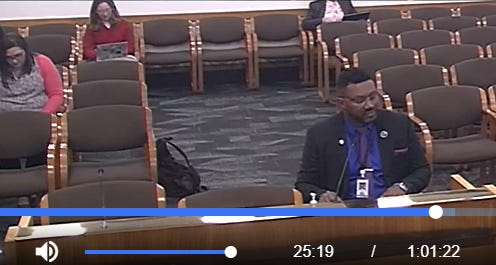Oregon changing course on DEI
In wake of Trump threats, the legislature quietly fast-tracks three Dem-sponsored bills that would strip racial preference criteria from some school programs

The Oregon legislature today continued a quiet but dramatic rollback of racial preferences in state education programs in the wake of the Trump Administration’s threat to deny federal funding to states that continue to use race as a criterion for program participation.
The House Committee on Education and Workforce Development this morning held hearings on two bills the original versions of which explicitly targeted programs at individuals the state considers “diverse,” but are due for amendments stripping those racial criteria.
The amendments stripping explicitly racial criteria received positive reviews from Democratic legislators generally favorable to racial preferences in state law, suggesting a decided departure of Oregon’s ruling party from its efforts in recent years to build such preferences into many state programs in the name of achieving what the state calls equity.
House Bill 3030 would transfer a school administrator training grant program from the Teacher Standards and Practices Commission to the Higher Education Coordinating Commission, a state agency that spends public funds “to improve equitable access to and success in higher education and workforce training for Oregonians,” according to the HECC website.
The current version of the bill would allow HECC to “award grants to culturally and linguisitically diverse school administrator candidates to use at approved education preparation programs[.]” It refers to an Oregon statute that defines “diverse” to include people from “black racial groups of Africa,” Hispanics. Asians and Native Americans.
An amendment to HB 3030, previewed during today’s hearing, would make a constitutionally critical change, removing the requirement that grants be awarded to “diverse school administrator candidates” in favor of candidates “who have experience with diverse populations.” HECC Director of Legislative and Policy Affairs Kyle Thomas’ written testimony for the hearing explained the reason for the amendment,
HECC has requested an amendment to the bill, to operate the program in a manner that is aligned with federal law and respects concerns that have been raised relative to equal protection and the use of eligibility requirements that can be based on race.
Thomas added the amendment “results in a program that the Commission believes, in consultation with the Department of Justice (DOJ), is free of constitutional concerns.”
Committee member State Representative Lesly Munoz (D-Salem), herself of Hispanic descent, said during the hearing she is “100% in support” of HB 3030 with the projected amendment.
House Bill 3006, also heard by the Committee today, in its current form would use $5 million from the state’s general fund to create a new grant program, administered by the Oregon Department of Education, to fund “affordable pathways and programs for individuals who are members of marginalized populations” to receive education to become teachers or administrators.
The goal of the bill, the bill says, is to match the percentage of administrators from “marginalized populations” to reflect the percentage of students from those populations. The bill does not refer to “marginalized populations,” but that term is commonly understood in the world of the State of Oregon to include members of racial minority groups.
State Representative Travis Nelson (D-Portland), a staunch progressive, testified to the Committee today in support of an amendment to HB 3006 that would, you guessed it, remove entirely the reference to “marginalized populations.” Instead, if amended, the bill would “expand the sharing of workforce data” and “modernize systems to monitor and evaluate educator workforce trends[.]”
Today’s actions follows the Education Committee’s approval of another bill, HB 2007, earlier this week to remove explicitly racial criteria for awarding state summer school grants. Oregon Roundup reported exclusively on the explicitly racial criteria for that program March 15.
HB 3030 and HB 3006 are set for Education Committee votes April 8. HB 2007 awaits an as-yet unscheduled vote in the Ways and Means Committee, and passage on the floor of the House and Senate. All three bills appear to have Democratic leadership support and are being moved swiftly through a very crowded legislative calendar.
The constitutional underpinnings of explicitly racial programs has eroded quickly in recent years.
Chief Justice John Roberts, in the U.S. Supreme Court’s 2023 decision in Students for Fair Admissions, Inc. v. President and Fellows of Harvard University, wrote that a college runs afoul of the 14th Amendment’s Equal Protection Clause when its admission policies confer benefits to some applicants based on the race of those applicants. It is widely expected the holding in Students for Fair Admissions will be applied by federal courts to other contexts in which states confer benefits in part on the basis of a person’s race or ethnicity.
President Trump has said his administration will withhold federal funding to states that persist in unconstitutional diversity, equity and inclusion (DEI) programs.
As reported by Oregon Roundup last year, the State of Oregon in 2021 adopted a “Diversity, Equity, and Inclusion Action Plan: A Roadmap to Racial Equity and Belonging.” The Action Plan calls on all state employees to seek to achieve in their official duties racially equitable outcomes, defined as “the redistribution of resources, power, and opportunity to . . . communities . . . impacted by systemic oppression.”
The 2021 DEI plan remains on the state’s website, instructing all state employees to redistribute resources and opportunity from Oregonian to Oregonian based upon their race.




This is all well and good yet it is the *indoctrination* taking place in classrooms that is the true existential threat. As we speak, Oregon educators are being trained — at great state expense — to apply ODE's new curriculum standards for K-12 Social Sciences: civics, economics, history. Students could be effectively brainwashed if this is not resisted at the local level.
It’s a tiny shift, but at least it’s in the right direction. Hopefully, compliance will be monitored so it won’t just be empty words.